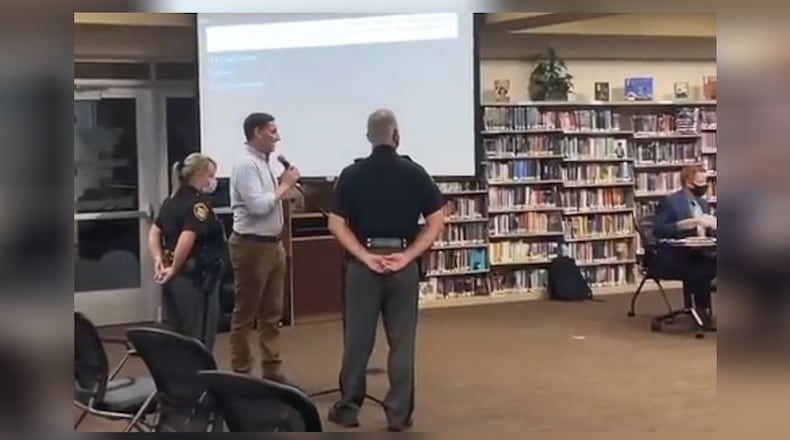“Nothing in Ohio law affords the public the right to make comments, pose questions or otherwise speak at a meeting of a public body,” according to Ohio Attorney General David Yost’s office. “Generally, most public bodies do give those attending in-person the opportunity to speak, usually under reasonable, defined and uniform limitations.”
And according to a 1984 U.S. Supreme Court ruling, “The Constitution does not grant to members of the public generally a right to be heard by public bodies making decisions of policy.”
However, there’s an expected right to speak at public meetings, and local governments allow the public to openly speak as long as they abide by established policies, which include limits on time and who can speak. With school districts, often parents and residents are the allowed speakers. In the case of Lakota, a parent or resident can have a designee speak on their behalf.
John Forren, Miami University’s chair of the Department of Justice and Community Studies, said there is some case law on both limiting speaking time and restricting public comments at meetings to residents.
“Basically, the usual reasons cited for both of those restrictions are that they strike a reasonable balance between the public’s constitutional right to petition their government for a redress of grievances and the practical need to conduct meetings in an efficient and orderly way,” he said.
If governing bodies open the meeting for public comment, they then cannot restrict that speech on the basis of disagreement.
Madison School Board was found to have violated a grandfather’s free speech rights during debates over the district’s gun policy, and the penalty, which has not yet been announced, could be “in the six figures,” Billy Ison’s attorney told the Journal-News this summer. The district’s policy was found to be proper, but the federal 6th Circuit Court of Appeals found the board restricted Ison’s “viewpoint speech.”
Lakota schools spokesperson Betsy Fuller said the board did not stop Mandel, who is one of 11 candidates seeking the open U.S. Senate seat in 2022, from talking because he was against mask mandates or how the school educates children. The board has heard similar objections, but they were from residents and parents of the Lakota district, she said. Mandel was stopped because he, and school board candidate Darbi Boddy, violated the board’s established policy. Mandel was not introduced as Boddy’s “designee,” according to the YouTube video of the Oct. 11 school board meeting.
Fuller said school board members “value feedback from our community,” and that is why there are multiple ways to communicate with the school board and district personnel. In addition to board meetings, the public can privately reach out to board members (contact info is on LakotaOnline.com) or at events. The district also has programs, like Lakota Listens, where people can contact departments and the school board directly, and Community Conversation, the next one is on Oct. 25 at Plains Junior School, 5500 Princeton Road, Liberty Twp.
“Lakota’s Board goes above and beyond many districts in Ohio by offering two public comment opportunities at each business meeting,” said Fuller, emphasizing that in order to participate, the board’s policy “must be followed.”
The board’s policy, which is 0169.1, permits the school board president to “interrupt, warn or terminate” a speaker for several reasons, including not being a designee or a Lakota parent or resident.
The city of Fairfield’s public comment rules aren’t as restrictive, but Mayor Steve Miller said schools are “a different animal.” But still, if they have a relevant concern, Miller said he’ll entertain them for the city’s 5-minute public comment allotment.
“We’re elected, we’re public servants, In my mind, we have an obligation to listen to them,” he said, though the mayor said they prefer that person calling in advance to either find answers, or help them before the meeting to possibly save them a trip to an evening meeting.
“But if somebody begins to get belligerent or disrespectful, it will get cut off in a hurry,” said Miller. “If somebody comes in and they have a valid concern, complaint or issue, let’s listen to them and let’s help them.”
Brian Hester, a Lakota parent and chair of the Butler County Democratic Party, said, “School board meetings are an opportunity for elected school officials to hear from parents in the district about things related to the school,” and not for politics.
He said the district “did the right thing.”
Butler County GOP Chairman Todd Hall said that “people have a right to share views, even if it isn’t what the school board wants to hear.”
“School Boards are not dictatorships, this is America. Some of the Lakota School Board members clearly demonstrated a disregard for free speech this week, they are elected by the people for the people.”
Staff Writer Denise Callahan contributed to this story.
About the Author

